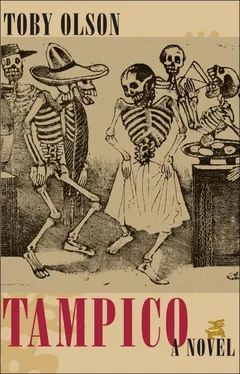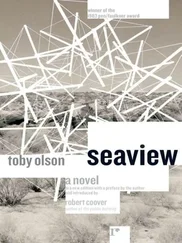“It’s not just the weather,” Joaquín said, a faint scent of mint touching my nostrils as he turned and looked out the window too. “It’s the Day of the Dead. Not the day itself, but first days of celebration.”
“And Calaca?” I said. “Will he be there too do you think?”
“Yes, well I suppose he will be there, no doubt of it.”
It was to be a formal negotiation only, Joaquín had said, talk of figures, the signing of a few documents, then a delivery of cash. Corzo, like most of the generals, required this, a way of legitimizing what was seen by the oil companies as no more than extortion. But the generals saw it as tribute, as well as a slap in the face to Obregón. Some were no more than gangsters, but Corzo was old enough to remember his legitimate power in the revolution and young enough still to have hope for the future correctives he felt he would be a part of. Joaquín wasn’t all that sure about his army, the two dozen men who like Calaca had joined only after the constitution had been signed. They had been with General Corzo for three years now, though whether it was wealth or patriotism that drew them wasn’t clear.
“And why me?” I’d asked. “I’m surely not dressed for it.”
Joaquín laughed. “Well, it might be the house, I think. Surely it’s Chepa. Curiosity? Beyond that I can’t be sure. He doesn’t know you of course. But he knows of you.”
“He asked for me?”
“Yes, well, in fact he did. But it was just asking. Nothing more than that.”
“I’ll have nothing to do there then.”
“No, not that. Just to be there. It’s all very formal. You’ll see. Nothing more.”
The clack of the train’s steel wheels and the grind of the couplings made talking impossible even though the compartment was very small, like a child’s playhouse, and our shoulders were brushing. Out the window, beyond the pipeline running below the track bed, the Panuco was cooking, waves slapping at rocks along the shoreline. I saw flying fish pop out of the swells, fight for a few feet against the wind, then fold into small cigars and disappear into the river’s dark waters.
We passed agitators, warehouses, paraffin plants. Black smoke rose in solid columns from the chimneys of stillstacks, then quickly dissipated in the stormy air. We passed the Corona terminal, then the Waters-Pierce, and beyond that, where the Panuco turned, I spied that oddly virginal banking, a stand of banana palms and resida , the place where Chepa had taken me fishing.
It had been early on in our relationship, and I had still been searching for ways to be with her in those quiet moments that were unattached to loving or the times in anticipation of it or in the sweet and equalizing hours afterward. I couldn’t quite figure who I could be with her, young as I was, how take the place of a man in her presence. And I was often awkward and silent, and that made her an urging mother, which was not exactly what I wanted. At least I didn’t think I did.
But then we hooked a fish, a monstrous tarpon, and we were together in our struggle into exhaustion on the steep, rocky shore to land it. It was seven feet long. I know that, because I lay down on the ground under the banana palms beside it while Chepa measured. Then she too lay down, on the other side, and after we’d lifted our heads and grinned at each other across the tarpon’s belly like children we fell asleep only to wake again as the sun was sinking. We made ourselves a spit then and a fire and roasted the fish, turning it in fire and starlight until the skin was brittle and wrinkling and the flesh at the surface was hot white.
Then, sitting across the massive fish from each other, we pulled away pieces of meat, eating and licking the oil from our fingers and wiping them on our clothes.
Our activities were everything to me then, and I saw that with Chepa there need be no vacant and unattached moments, nothing of the absence of anticipation. I think I knew even then, as I tasted the fish, that this was my first life lesson and that it might go beyond even her, and I have tried to carry Chepa with me through all my travels in that knowledge.
Our four-car train clacked slowly toward a halt, and while it was still creeping ahead Joaquín opened our cabin door and the salty breeze washed in and rippled my collar, causing the tip to tap against my cheek. The wheels squeaked and the train stopped and I followed Joaquín, stepping down onto the gravel slope of the track bed and below it sandy soil. Up ahead the toy engine idled beside the guardhouse kiosk, and between them I could see the thin passage of the rail spur and the pipe running beside it as they headed on their systems of elevated pilings out into the Gulf and along the water’s swelling surface to the Texas Oil sea terminal, a low cluster of tanks and buildings, its flags blowing, awash in wind and spray on its platform a quarter mile off. A massive tanker was docked there, and beyond, where high waves had risen near the edge of a fog bank at the horizon, I saw the shadows of two others under a darkening sky.
Papers were passed, an arm held out a clipboard, then the train was moving again, and in moments the view opened and we could see the rutted dirt road that climbed to a low seaside crest and the roofs of the first buildings of Chorreras.
“Okay, then, vámonos ,“ Joaquín said, and we stepped up to the track bed and over it and headed for the hill and the town.
The place where we were to meet General Corzo was situated at the far end of the village, a little beyond it, on a low bluff overlooking the sea. It had once been a public building, a place for women to gather and watch out for their husbands in stormy or clear weather as they fished at the edge of horizon. Used too, Joaquín had said, for drying fish in the sun on racks outside.
“But now it belongs to Corzo. You’ll see, he’s done some work on it. He won’t be there, you know. Not until we are.”
We walked at the edge of the muddy track of the main street. It was two o’clock and still siesta, but this was no longer a Mexican town and we saw lights in windows of those at work, passed a few huddled figures in a hurry to get somewhere, leaning into the wind. The sky was almost completely black now and the light like that at dusk. Joaquín wore a heavy, oilcloth raincoat, his hand over his heart to keep the fabric from filling with air, and I’d put my flight cap back on, buckling it tight under my chin. Then we passed the last town building and I could see the house a few hundred yards up in the distance, what light there still was washing in its windows.
It was a square box, with a widow’s walk on top, but the general had torn away the central cupola, turning the walk into a sundeck. I saw lawn chairs and a metal table there, a closed umbrella sticking up from its center, its edges flapping in the wind. Below he’d set large windows into the old board walls to get the view, and the path leading up to the house was white stone lined with cactus, a trellis hanging with bougainvillea surrounding the entrance door.
Joaquín knocked and we waited, then heard the sound of feet on wood. Then the door opened and a man who looked very much like Joaquín himself, though younger, stood aside, raised up his arm and ushered us in. This will be Sosa, I thought, a man with a woman’s name. The translator. Joaquín had told me about him, something General Corzo insisted upon. He would speak no Spanish with Joaquín.
“Sosa might be my counterpart, a patriot. Lucky that we look alike, a way for the general to insult me without actually doing so. In his eyes I’m a turncoat, but then he needs me, you know, to make it all go smoothly.”
The house held only the one small room, but the large windows lining three of the walls brought the outside in, expanding it, and from where I sat I could see both into the Gulf and along the rocky shore for a good distance. Waves washed on the rocks now, spray obscuring them, then leaving them to glisten under the dark blanket of cloud cover as the surf receded, and out the front window the sea had risen up into whitecaps all the way to the fog bank, which had crept in a little, and the tankers had disappeared.
Читать дальше












